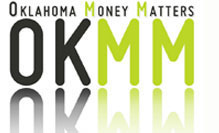October: Finding Financial Aid
Welcome to the October edition of Financial Friday, Oklahoma Money Matters' online personal finance newsletter. October means time for the FAFSA, or Free Application for Federal Student Aid. Allow OKMM and UCanGo2 to assist you in your journey in funding your higher education.
This month, we're answering a question about applying for financial aid to help with the costs of college.
My daughter is a junior in high school this year and we’re preparing her for college. We both work and we’re concerned we won’t qualify for enough assistance to cover the educational expenses. What can we do now to help?
You’re not alone. Many parents are concerned about paying for college and often assume that they make too much money to qualify for financial aid programs. Here are some helpful tips.
|
- Fill out the FAFSA anyway. Your daughter should complete the Free Application for Federal Student Aid (FAFSA) as soon as possible after Oct. 1 during her senior year of high school. It’s free to submit and serves as her first step in the financial aid process. The FAFSA determines your family’s eligibility for aid, like federal and state grants, some types of scholarships, work-study opportunities and federal student loans. Most applicants qualify for some type of financial aid.
Most institutions nationwide use FAFSA results to create an aid offer that can help you fund her education. It’s important to complete the FAFSA each year she’ll plan to be in college, even if you think you won’t qualify for aid. Some scholarship programs require a completed FAFSA, as well. If for any reason your financial situation changes during the school year, it’s easier for the college’s financial aid office to help you find additional sources of funding if you already have a FAFSA on file. Visit FAFSA.gov to find the online application.
- Save what you can. It’s not too late to begin saving money to help your student pay for college. Look at your monthly budget and consider which expenses could temporarily be suspended in order to direct that money into savings, such as a 529 college savings plan, which offers tax benefits on the money you contribute.
- Consider concurrent enrollment. Consider signing up for concurrent enrollment. High school juniors and seniors who’ve made good grades throughout school or scored well on the ACT or SAT may be eligible to take credit-earning college courses while still in high school. Depending on available funding, they may even be able to get a tuition waiver to cover some of the cost. Learn more about concurrent enrollment here: OKcollegestart - Concurrent Enrollment
- Stack up the scholarships. There are billions of dollars in scholarships awarded every year to help with college expenses. You don’t necessarily have to be a merit scholar or an all-state athlete to qualify; scholarships are offered for all types of reasons. Check out sites like UCanGo2.org and OKcollegestart.org for scholarship options. Talk to your daughter’s college admission recruiter or financial aid officer about possible campus-based scholarship opportunities, as well. Encourage your daughter to pursue scholarships that require essays – generally, there are fewer applicants for those options - and pay close attention to deadlines and individual scholarship requirements. Review the UCanGo2 publication, Are You Looking for Money?, for scholarship links and tribal information.
- Compare colleges. There are many factors to consider when selecting a college or university, including cost of attendance, degree offerings and proximity to home, which can reduce overall living and transportation expenses. For some students, it may make sense to live at home and complete general education courses at a local community college, then transfer to a four-year university. Compare campus features and offerings under the College Planning tab at OKcollegestart.org.
|
If you have money-saving tips you'd like to share, email us at OklahomaMoneyMatters@ocap.org.
Thanks for participating in Financial Friday. Remember, there is always time to take control of your financial future!
The OKMM Team
Subscribe to our monthly Financial Friday newsletter!! |




